[Part I of II]
Imagine, two weeks in a new country since corona set in. Ireland had just opened for travelers in mid-July. Jette, my companion, and I encountered Ireland’s warm hearts undeterred by cold winds.
Of twenty Irish we asked for directions or other assistance, only one ignored us. In that same period, ten people approached to ask if we needed help. Seldom can one find such consideration anywhere!
On the streets can be found everyman’s poet, song-writer, musician. Many common people still embrace working class consciousness. Several Irishmen we met knew of and respected Che (my ideal “new man”) for his solidarity values. They are proud that Che had Irish family roots, and of his one brief visit to their country for which they fought so long and hard to retake from marauding Scandinavian Vikings and British colonizer-slavers. (1)
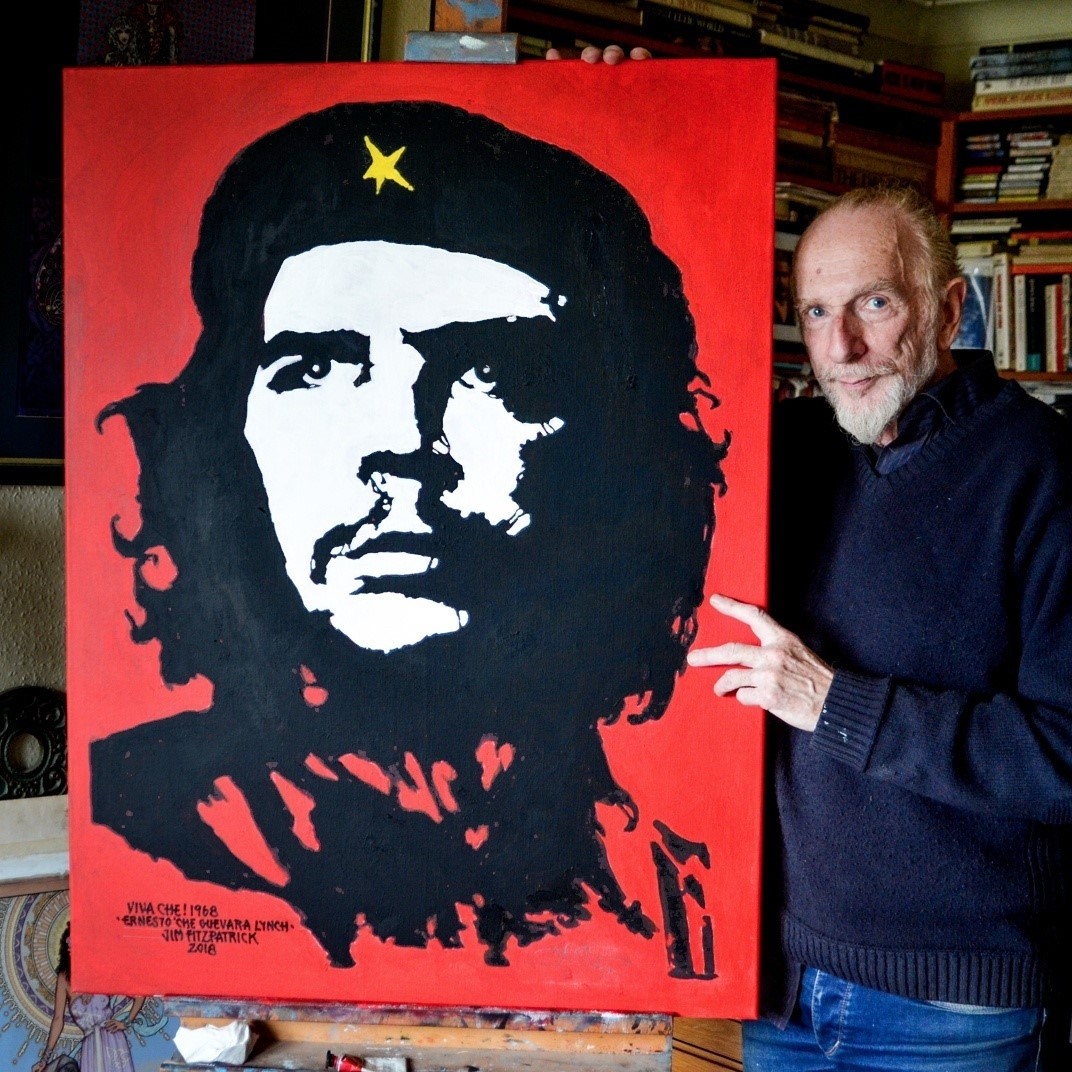
Che Guevara Painted Canvas – Jim FitzPatrick Irishman FitzPatrick 1968 painting fashioned from Cuban photographer Alberto Korda’s famous photo.
My main reason for choosing Ireland to visit was to meet friend-colleague Finian Cunningham. When we arrived in west Ireland at his home in Enniscrone I learned from his neighbor Gina that a young Irish artist, Jim Fitzpatrick, had met Che in Ireland and later made what became the famous painting based upon Cuban photographer Korda’s iconic photo of the guerrilla leader. Fitzpatrick’s image is used on Che T-shirts, one of which I have.
Che has been my key guide in life. Here is one of his visions, shared by many millions of us who fight for a world based on equality and peace, an end to rich vs. poor and its consequent wars.
“At the risk of seeming ridiculous, let me say that a great feeling of love guides the true revolutionary. It is impossible to think of a genuine revolutionary lacking this quality. One must have a large dose of humanity, a large dose of a sense of justice and truth to avoid dogmatic extremes, cold scholasticism, or isolation from the masses. We must strive every day so that this love of living humanity is transformed into actual deeds, into acts that serve as examples, as a moving force.” (“From Algiers, for Marcha . The Cuban Revolution Today.” Socialism and man in Cuba (marxists.org)
In this writing, Che also expresses how we humans exist in an alienated state of labor and mind. He argues that eliminating alienation must be top priority for socialist revolutions. In referring to the first few years of the Cuban revolution in his Marcha letter of 1965, he wrote: “Man truly achieves his full human condition when he produces without being compelled by the physical necessity of selling himself as a commodity.”
“The greatest obstacle has been our fear lest any appearance of formality might separate us [leaders] from the masses and from the individual, [which] might make us lose sight of the ultimate and most important revolutionary aspiration, which is to see man liberated from his alienation.”
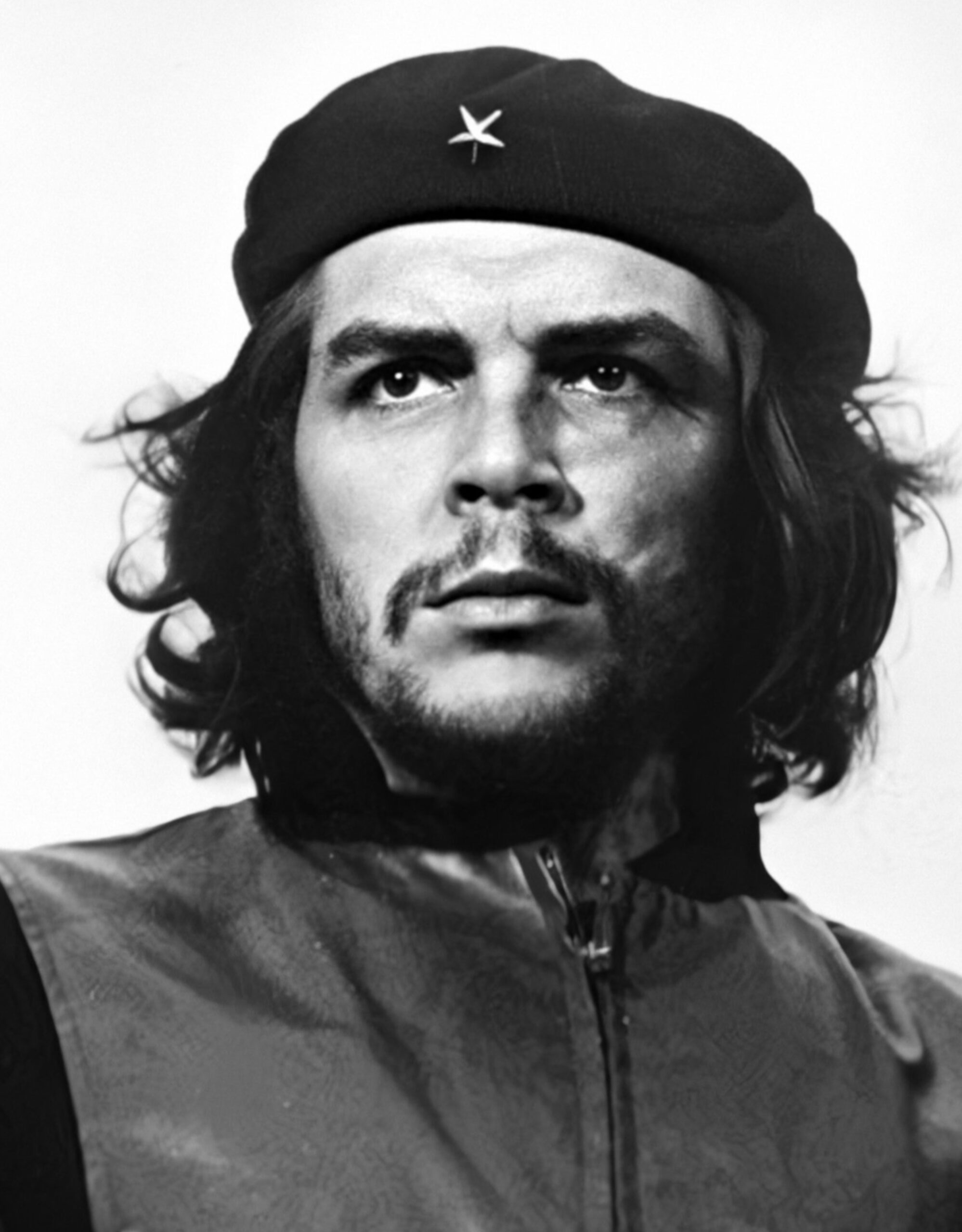
Korda’s photo https://en.wikipedia.org/wiki/File:CheHigh.jpg
Not only did Jette and I encounter many Irish people who think well of Che but they were also more willing to see the ills of capitalism than most Westerners. I believe this is so because they identify with Che’s family roots; what he stood for—liberation from greedy capitalism—and because of Ireland’s history of enslavement and discrimination under Vikings and later the British Empire.
Fitzpatrick explained meeting Che. “On a beautiful sunny morning in the summer of 1961, I was working in the Marine Hotel bar in Kilkee, Co Clare on my own. I was only a teenager [16]. I travelled down to the seaside village to work in the hotel while on school holidays.”
Fitzpatrick saw Che and two other Cubans walk into the bar. They were on a flight to Havana from Moscow and had to stop in Ireland for technical-fog reasons. Che ordered Irish whiskey, and they “talked for a few minutes once he realized I knew who he was. His English was faltering, but he could make himself understood. The first thing he said was, ‘You know I’m Irish. My father was Guevara Lynch´ [the fifth generation from Patrick Guevara Lynch, whose tribe fled Galway for Argentina in the 18th century when the English were after them. Argentina has one million Irish descendants]. He said he was proud of his Irish ancestors and that the Irish brought down the British Empire.” Fitzpatrick described Che as “curious” about Ireland “from a revolutionary point of view” Ché Guevara in Kilkee – Kilkee Heritage: Past & Present (clareheritage.org) and Jim Fitzpatrick (artist) – Wikipedia
In the aftermath of Che’s death, his father spoke of how family roots had played a part in forming the rebel Che Guevara: “‘Che inherited some of the features of our restless ancestors. There was something in his nature which drew him to distant wandering, dangerous adventures and new ideas,’” wrote Pauline Murphy, Rebel Blood: Che’s Irish Heritage – CounterPunch.org
Kilkee celebrated the 50th anniversary of Che’s visit. This festival is held every year since. Che’s daughter Aleida spoke at one. Che Guevara’s Irish Roots – The Irish in Argentina (nomadflag.com)
Fitzpatrick’s painting was chosen to be a commemorative stamp in 2017, 50 years after Che was captured in Bolivia and murdered under CIA orders. The stamps were so popular they ran out in 2 or 3 days, unprecedented. Also unheard of the stamps were not renewed due to anti-Che political pressure. Commerative stamps normally are on sale for months
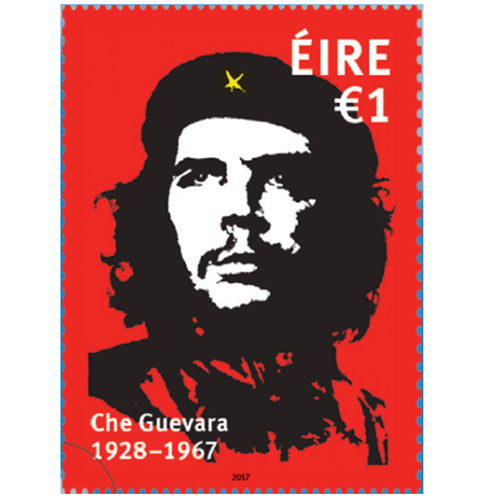
Coincidentally, as I write about Che here, Denmark’s public service television, DR2, sends “Godfather 2”, which has several scenes of Mafia leaders in Cuba at two of their Havana hotels, Hotel Nacional and Hotel Capri. They were planning Cuba’s future as the July 26 revolutionary movement was winning their guerrilla war against the dictatorship’s army.
Soon thereafter with Cuba freed from dictatorship, the U.S. government and Mafia, the Irish-born actress Maureen O’Hara met with Che at Hotel Capri, on April 15, 1959. She was filming “Our Man in Havana”. (Graham Greene.) O’Hara wrote about this encounter in her memoir.
“When we arrived in Havana on April 15, 1959, Cuba was a country experiencing revolutionary change. Only four months before, Fidel Castro and his supporters had toppled Fulgencio Batista… Che Guevara was often at the Capri Hotel. Che would talk about Ireland and all the guerrilla warfare that had taken place there. He knew every battle in Ireland and all of its history. And I finally asked, ‘Che, you know so much about Ireland and talk constantly about it. How do you know so much?’ He said, ‘Well, my grandmother’s name was Lynch and I learned everything I know about Ireland at her knee.’ He was Che Guevara Lynch! That famous cap he wore was an Irish rebel’s cap. I spent a great deal of time with Che Guevara while I was in Havana. Today he is a symbol for freedom fighters wherever they are in the world and I think he is a good one.” maureen o’hara in havana | Search Results | Come Here To Me!
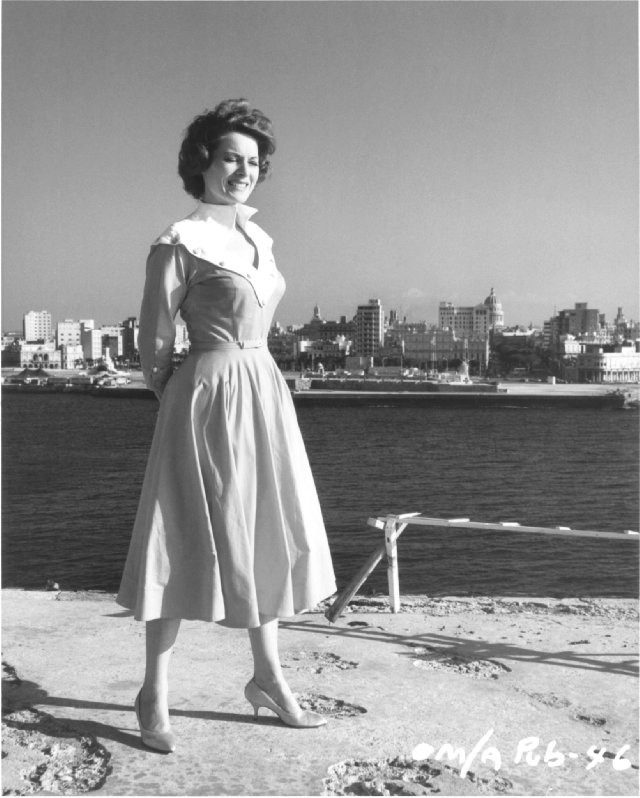
Maureen O’Hara in Havana during filming “Our Man in Havana”.
Creative Commons — Attribution-NonCommercial-NoDerivs 3.0 Unported — CC BY-NC-ND 3.0
Dublin
Che’s universal vision coexists with that of Irish voices for liberation. We found that to be the case when Ireland opened for travelers. We visited the Garden of Remembrance in Dublin. President Éamon de Valera inaugurated the Garden in 1966. He had been a leading fighter in the 1916/1922-3 uprisings and the civil war. The Garden opened on the 50th anniversary of the 1916 Easter Uprising, honoring all freedom fighters during insurrections of 1798, 1803, 1848, 1867, 1916, 1919-21. A poem by Liam Mac Uistin was placed at the entrance to symbolize what they stood for.
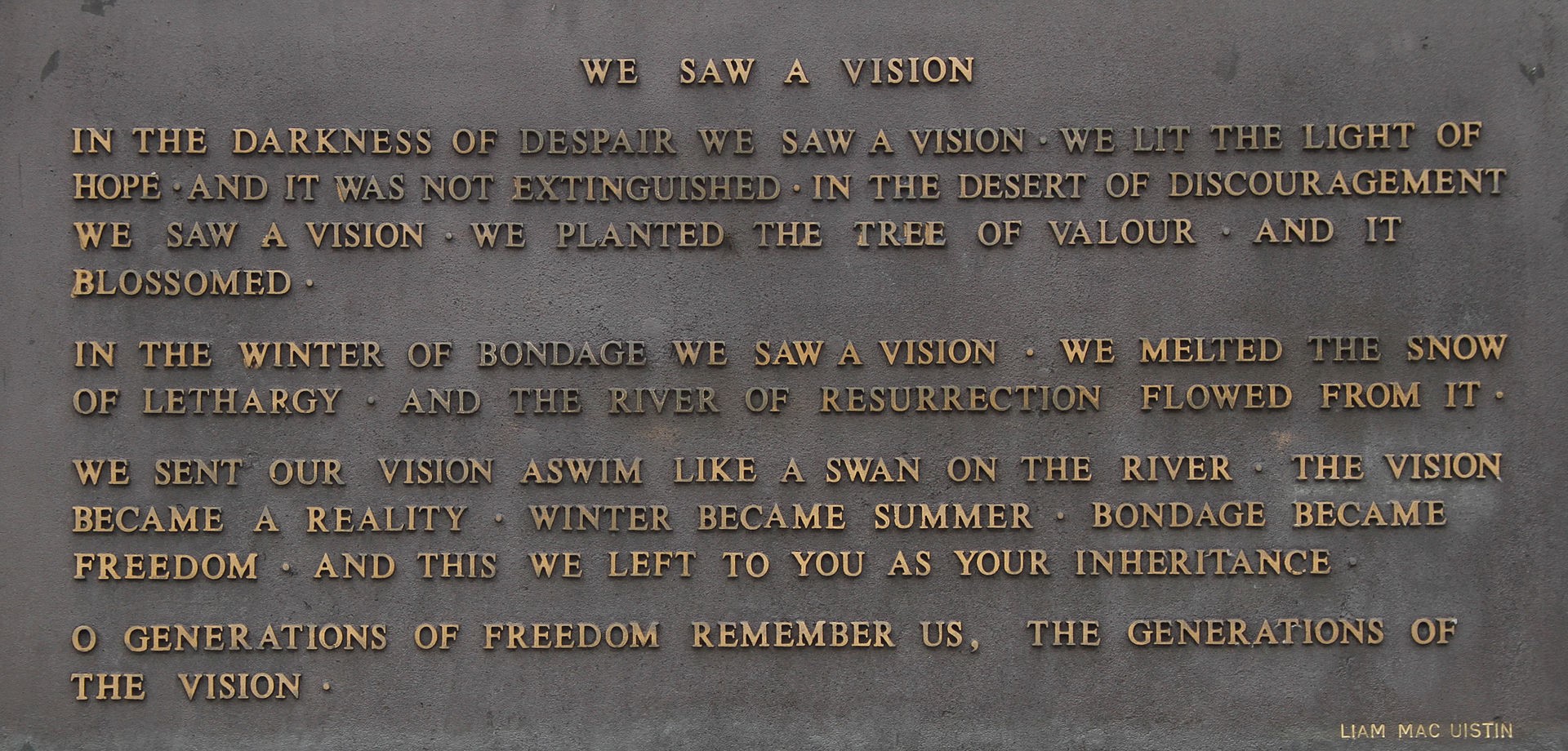
We walked down from the Garden to the center and along River Liffey. We stopped at a little sidewalk café, “Mulligan’s Potato Cake” for their authentic homemade lemonade and potato cakes. We had to duck a couple times not to be splashed with seagull shit. The city has been taken over by gulls that prey on food waste, tearing apart bins creating a mess, reminding me of many cities in India where monkeys rule. Monkeys and gulls don’t stop at rubbish. They plunge at sandwiches and ice cream cones. Gulls squawk incessantly flying and feasting on airborne ants. Gulls swoop up ducklings from parks, attack cats and even foxes. Many herring and black-backed gulls also attack people, and frighten parents of small children.
Gulls make a tremendous screeching racket perched on house chimneys. They scream so loudly and constantly that we were awakened in pre-dawn hours at the inn where we stayed near the city center. The city council issues permits to some organizations and private individuals to scare gulls away, and to remove nests and eggs from buildings, such as the gigantic Guinness brewery. Nevertheless, Dublin is still under the wings of seagulls.
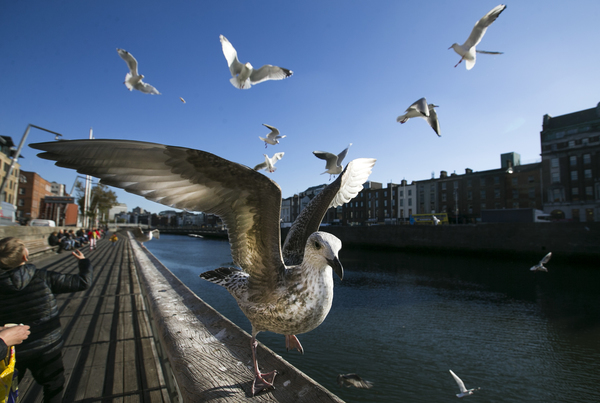 Source: Sam Boal/RollingNews.ie ‘Unprovoked attacks by a gang of feathered brutes’: Dubliners cry foul over seagull aggression (thejournal.ie)
Source: Sam Boal/RollingNews.ie ‘Unprovoked attacks by a gang of feathered brutes’: Dubliners cry foul over seagull aggression (thejournal.ie)
Two waitresses at Mulligan’s are from El Salvador and Venezuela, and they reflect opposite political views. The Salvadorian had witnessed death squads brutally ruling her country under the Pentagon’s eagle eye. She likes Che and comprehends the need for struggle to gain liberation. Her colleague hates Hugo Chavez, who admired Che. Chavez was Venezuela’s popular folk president. Since his death, the U.S. has made the oil-rich nation poor through its ruthless sanctions, and some Venezuelans, such as this woman, have fled the country blaming Chavez’s elected replacement, Nicolas Maduro, for their ills rather than the ever-dominating culprit.
I asked them why there are so many Spanish and Portuguese speakers in Dublin. They replied that it was easy to get visas, service jobs are plentiful, and that it is easy and affordable to learn English at schools while working part time. As we spoke, a trio of Spanish musicians passed by. They agreed about Ireland’s welcome, and that Irish culture meshes with Latin Americans.
The owner, Danny, seemed to agree about tempos when I told him how tasty his lemonade was. “Well, it takes a bit of time to make, and that is what Big Capital doesn’t have.”
At our first pub stop, customers and waiters spoke to us, even inquiringly. I was caught off guard. Such “forwardness” is frowned upon in Denmark. Following conversations, people often say something like, “Thank you for the talk. It was pleasant meeting you.”
I lived 13 years in Cuba, Brazil, Nicaragua and for months in Mexico, Venezuela, Bolivia, Costa Rica and El Salvador. Despite the fact that Ireland lays in the colder North Atlantic, Irish warmth is often associated with tropical climate.
Ron Blues
Ireland’s tempo can be problematic when it comes to making connections between buses and trains, for example. Some persons told us that one must not take organizing/coordinating for granted. Bus drivers may drink an extra cup of coffee during pauses as the clock ticks. It was also difficult to know what exhibitions/museums were opened or where James Joyce’s house-museum was or even if it still existed. We couldn’t find lamb on the menus even though during our train-bus travels westward the omnipresent green grass was being eaten by thousands of sheep and their lambs.
On the other hand, much of Ireland’s infrastructure is more “advanced” than even in Denmark, perhaps because Apple Corporation has taken over so much, and done so without paying taxes. Other technology companies also prey on our abilities to control technology. For instance, in one pub-inn where we stayed the lights run on their own. One opens the bathroom door and the light-fan goes on; close the door and they eventually shut down but not until making noises that the owner-technicians cannot control to the irritation of my oversensitive ears.
Taking the train is also difficult for my senses. The old-timer at the ticket office informed me that he had to assist the state-run train company phase out many jobs such as his. Soon tickets will be sold only “online”. The man said he would retire soon and there would be no replacement. I didn’t bring my computer on purpose. I was on vacation, after all, and didn’t know how to do the online, which is often not simple for me anyway. So, I had to pay 40% more than the ticket would otherwise have cost. The old-timer neglected to tell me that I also had to have seat reservations. When the time came to travel, I was referred over telephone to purchase them at a machine. I told the worker that I didn’t want to be confronted with “fucking machines”. She hung up on me, because I used “vulgar language”. Tears of powerlessness whelmed. I found someone nicer at an information cage. He explained how to do this and watched me as I fumbled. He then did it for me against “the rules”. Once on the train, there were no seat reservations due to corona.
This profound sense of alienation humiliates; it spreads and deepens throughout the world. For me, I feel more alienated than at any other time in my life. Not only do the “employers” who decide the key matters of economic and political policies, make wars, murder and torture millions. Employers train us to believe that we have to have owners over us, in order to produce and decide the big issues. It seems that few people remember, or know of, the 60s-70s when we had at least something to say when we fought their wars from the streets. Today, we don’t have control over our daily lives. I even have less control over paying for things. I had to use 20% of the sum on a U.S. government corona check to get it cashed, in a complicated and inexplicable process, because the U.S. state only sends checks to its citizens even if they live in countries, such as Denmark, that no longer use checks. I donated the rest of the sum to Julian Assange’s defense—the most important messenger of real truths in the world today.
I won’t even go into my experiences with Ryanair. I flew with them, my first and last time, only after I insisted to know if they are unionized. They are, albeit with poor conditions. Furthermore, flying from Denmark to Dublin could only be accomplished with Ryanair unless I would pay FIVE times the Ryanair price, and spend 6-12 hours stopover in Oslo or Paris for the three-hour flight.
And writing about these ills? All these words, and so what? Who cares?
Sunshine
Ireland’s sun glistens over bountiful waters sprinkling the grasses ever green, crashing upon the shores, flowing in the Atlantic and in rivers with delicious fish and seashells so specially shaped.
People’s friendliness is also bountiful. Another example occurred on the train returning to Dublin. I was explaining to a passenger my sorrows in this modern world of communication. Among my woes was the need to book our return flight online or else Ryanair would charge us 50 Euro at the airport to do it. A woman across the aisle raised her head from her laptop.
“I overheard your problem with online, and the need to book a flight. I can do that for you if you give me the details.” Savior she. It turned out she also works for the major newspaper, The Irish Times. Finian worked there in the 1990s.
Now, the problem was to get it printed, because, of course, I have no fucking apps on my “outdated” Nokia. Furthermore, because I don’t have a “smart” phone I can’t pay for anything online any longer since Denmark “improved” security by forcing people to buy certain mobiles, and discard old-fashioned ones like mine. No way!
Sebastian works at Dublin’s Georgian-style Gardiner Lodge. Since he is from Uruguay, we spoke Spanish when we were there our first days. He might be there for our last night. Sure enough, we found him at the reception desk.
No problema, compañero. Flicking finger clicks. Out came copies of our bookings. To top it off, Sebastian gave us a discount and showed us to the one de lux room they have. Farewell present.
(1) About 40% of Irelanders speak some Gaelic today. Gaelic originated in Ireland. Gaels traded with the Roman Empire and fought them in defense as well. In the early Viking Age, raiding parties took over parts of the Gaelic lands and some of the people were forced to copulate, or order to bear Norse-Gael offspring. They dominated much of the Irish and Scottish Sea regions between the 9th and 12 centuries, and founded the Kingdom of Dublin.
In the 12th century, Anglo-Normans (French Normans were originally Scandinavian/Norse Vikings) conquered parts of Ireland leading to centuries of violent conflicts. Gaelic culture, however, remained strong throughout Ireland, Scottish Highlands and Galloway. In the early 17th century, the last Gaelic kingdoms in Ireland fell under English control.
Anglo-Normans became the ruling class in England following William the Conqueror’s victory in 1066, which eventually united England into a kingdom, including Scotland, Wales, and Ireland following the Norman conquest of 1169. The Norman settlers felt no community with the earlier Danish settlers in England, despite the fact that they were themselves partly descendants of the Danish Vikings.
Both contemporary queens of the “United Kingdom” and “The Kingdom of Denmark” (Elizabeth and Margrethe) say they are descendants of Vikings, as if 1000 year-old blood is holy and reason to over others. Gaels – Wikipedia and Norse–Gaels – Wikipedia
I won’t go into the history of how the Irish fought and finally won their independence from the colonialist-imperialist British but during our stay in Dublin we visited museums and markings where the long fight for liberation are explained. Among the museums is the great General Post Office. Here is where Irish rebels had their headquarters during the 1916 Easter Uprising. You can see a documentary film, and many documents and photos of the uprising, the 1919-21 war for independence, which led to internal divisions following a less than total victory, and the 1922-3 civil war. These struggles resulted in the current Irish Republic governed by parties that fought the British . GPO – General Post Office – O’Connell Street – DublinTown
Today, there are four million Irish in the Republic and one million in Northern Ireland. Moreover, some 70 million people originating from Irish roots live in other countries (about half in the USA). Millions of Irish have fled Ireland due to potato blights (especially in mid-19th century), other starvation periods due to frost and a one-crop economy, and persecution by the English/British.
…..
Ron Ridenour, member of TCBH, retired professional journalist, anti-war and civil rights activist; author of 12 books: “The Russian Peace Threat: Pentagon on Alert”. https://www.amazon.com/Russian-Peace-Threat-Pentagon-Alert/dp/0996487069; six books on Cuba, (“Backfire: The CIA’s Biggest Burn” among others, “Cuba at Sea”); “Yankee Sandinistas”, “Sounds of Venezuela”. www.ronridenour.com; ronrorama@gmail.com.
